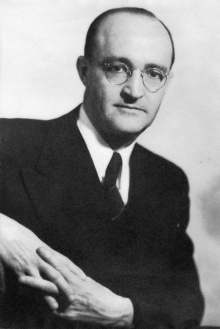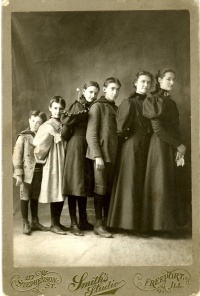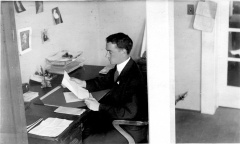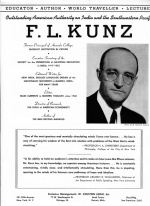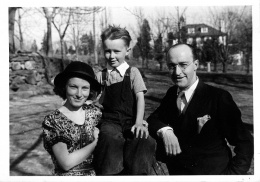Fritz Kunz: Difference between revisions
No edit summary |
No edit summary |
||
| Line 1: | Line 1: | ||
<b>ARTICLE UNDER CONSTRUCTION</b><br> | <b>ARTICLE UNDER CONSTRUCTION</b><br> | ||
<b>ARTICLE UNDER CONSTRUCTION</b> | <b>ARTICLE UNDER CONSTRUCTION</b> | ||
| Line 74: | Line 73: | ||
Fritz Kunz died on February 13, 1971 in New York. | Fritz Kunz died on February 13, 1971 in New York. | ||
== Books and | == Books and pamphlets == | ||
In 1937, Kunz saw the publication of his first book. '''''The Men Beyond Mankind: A Study of the Next Step in Personal and Social Emotion''''' (New York: David Mackay, 1937) discusses the evolutionary process that led to humankind, the nature of human consciousness, and the types of beings that will succeed humans. It is available in digital form on a [http://hpb.narod.ru/MenBeyondMankindFK.htm Russian web page.] | |||
Another book, '''''Integrative Principles of Modern Thought''''' was to be published by Gordon and Breach in 1970.<ref>Letter..... January 1969. Kunz Family Collection 25.01. Theosophical Society in America Archives.</ref> Kunz died before publication took place, and the work was published in 1972 by Kunz' longtime associate Henry Margenau. | |||
In addition, he wrote several pamphlets, including: | |||
* '''''Sex Concepts for the New Age'''''. Chicago: The Theosophical Press, 1926. A lecture given on September 26, 1926 in Hollywood, California. | |||
== Articles == | |||
Mr. Kunz was a prolific writer of articles for Theosophical periodicals. The [[Union Index of Theosophical Periodicals]] lists articles published under the name [http://www.austheos.org.au/cgi-bin/ui-csvsearch.pl?search=Fritz+Kunz&method=exact&header=field4 Fritz Kunz] and under the initials [http://www.austheos.org.au/cgi-bin/ui-csvsearch.pl?search=FLK&header=field4 FLK]. Kunz also used pseudonyms during the years 1914-1917 including L. E. Girard, E. L. Girard, S. E. Girard, and Fabius Cunctator, and probably wrote many articles anonymously when he was working for Annie Besant at Adyar. | |||
He also contributed many articles to popular magazines and academic journals. | |||
== Recorded lectures == | |||
Some lectures are available on compact disc for loan from the [[Henry S. Olcott Memorial Library]] and for purchase from the [http://www.questbooks.net/authors.cfm?letter=k Theosophical Publishing House]: | |||
* "Akasha". 1970. | |||
* "Science, Education, and Spiritual Development". 1970. | |||
* "Reminiscences of Annie Besant and C.W. Leadbeater". 1967. | |||
Many additional lectures and informal talks were recorded on magnetic tape reels that are in the Archives Department of the Theosophical Society in America. | |||
== Correspondence, pseudonyms, and handwriting == | == Correspondence, pseudonyms, and handwriting == | ||
| Line 89: | Line 102: | ||
In writing to his sisters and friends, he was high-spirited and playful, often using nicknames and pseudonyms. To correspondents, he usually signed as FLK or FK, but sometimes as Lent <nowiki>[</nowiki>significance unknown<nowiki>]</nowiki>. He addressed Alma Kunz as A, Litta Kunz as Lid or Boans, Minna Kunz as Schmidt, and Leadbeater as Uncle. He used pseudonyms in some of his writing for Theosophical periodicals, including L. E. Girard, E. L. Girard, S. E. Girard, and Fabius Cunctator during the years 1914-1917. | In writing to his sisters and friends, he was high-spirited and playful, often using nicknames and pseudonyms. To correspondents, he usually signed as FLK or FK, but sometimes as Lent <nowiki>[</nowiki>significance unknown<nowiki>]</nowiki>. He addressed Alma Kunz as A, Litta Kunz as Lid or Boans, Minna Kunz as Schmidt, and Leadbeater as Uncle. He used pseudonyms in some of his writing for Theosophical periodicals, including L. E. Girard, E. L. Girard, S. E. Girard, and Fabius Cunctator during the years 1914-1917. | ||
== Additional resources == | == Additional resources == | ||
*[http://www.theosophical.org/publications/quest-magazine/1458# In Profound Gratitude] by Edward Abdill | *[http://www.theosophical.org/publications/quest-magazine/1458# In Profound Gratitude] by Edward Abdill | ||
* "Theosophists Who Changed My Life". Audiorecording, 1996. Available from the [[Henry S. Olcott Memorial Library]]. Four theosophists remember others who influenced their lives, including a remembrance of Fritz Kunz by his son, John Kunz. | |||
== Notes == | == Notes == | ||
<references/> | <references/> | ||
[[Category:Educators|Kunz, Fritz]] | [[Category:Educators|Kunz, Fritz]] | ||
Revision as of 20:28, 20 January 2014
ARTICLE UNDER CONSTRUCTION
ARTICLE UNDER CONSTRUCTION
Fritz L. Kunz (1888-1971) was an American lecturer, educator, editor, and writer associated with the Theosophical Society based in Adyar, India. He was married to Dora van Gelder Kunz, who served as President of the Theosophical Society in America.
Early years
Frederick L. Kunz was born on May 16, 1888 in Freeport, Illinois. He was the twelfth and last child of Frederick John Kunz and Susan R. Knecht Kunz, who were naturalized citizens of German birth. He was usually known as Fritz. Not all of the children survived until adulthood, and the ones shown in the photograph at right are those with whom he spent the most time. From right to left, in descending age, are Alma, Minna, Bill, Litta, Sue, and Fritz.
Both parents and several older siblings became members of the Theosophical Society soon after attending the World's Parliament of Religions in 1893 in Chicago, and were active in the Freeport Lodge. Fritz was only five years old in the year of the Parliament, and was not allowed to attend, but he was soon engaged in the service of Theosophy by helping with the office work of the lodge. He became a member in 1902. TS lecturers visited the Kunz family in Freeport, and Fritz became acquainted with Charles W. Leadbeater.
Travels with Charles Leadbeater
In 1903 Fritz visited Leadbeater in California, and in 1904 traveled with him on the East coast. In 1905-1906 they went to Hawaii, Samoa, Australia, India, Burma, Ceylon, and Egypt on an extended lecture tour, and home by way of Italy, France, and London. Fritz and a young Englishman, Basil Hodgson-Smith, worked as secretaries to assist Leadbeater with correspondence.
Education
Upon returning from his year of travels, Fritz resumed his secondary education at Freeport High School, receiving his diploma in June, 1908.
From 1908 to 1912, Kunz attended the University of Wisconsin and received a B.A. in English literature. Several family members were in Madison during that period. During his early years young Fritz was very active in tennis, swimming, bicycling, canoeing, camping, hiking, and basketball; and enjoyed Big Ten football games. He attended concerts and had an active social life, but did not join any campus organizations.
In his later years, his professional writing used the byline Dr. Frederick L. Kunz. In the 1930s, he began to sign articles as "Fritz Kunz, M.A.," so it is likely that he earned a master's degree, but the doctorate may have been honorary.
Work at Old Krotona
Kunz became one of the first residents at Krotona Institute in Hollywood, California, where he assisted A. P. Warrington for one year with office work and editing periodicals. He enjoyed the work and the adventure of establishing a new institution, but had to leave after a year because he could not afford to work unpaid.
Principal at Ananda College
Late in 1913, Leadbeater sent a telegram offering Kunz a position as principal of Ananda College, a Buddhist school founded by Henry S. Olcott in Colombo, Ceylon. Druing his tenure from 1914 to 1917, tenure he instituted many improvements at the school, raised funds, and supervised several construction projects. His sisters Alma and Minna and brother-in-law Hervey Gulick joined the school faculty for a time. At Kunz's request, his brother-in-law Hervey Gulick brought an Encyclopedia Britannica with him from America. It was a treasured resource that only the upper classmen were allowed to use under heavy supervision.[1]
In Ceylon, as later in India, Kunz supported social and educational reforms with his work in the Ceylon Service League and other organizations. He assisted Sir Pannambalam Arunachalam in writing the famous address "Our Political Needs," that initiated Ceylon's independence movement. Mr. Kunz became increasingly active in attempting to improve conditions of the lowest level of society. His social activism caught the attention of the British, who called him "stumpy," and "that short little Buddhist American." As the political environment became more volatile, the British suspended the constitution and instituted martial law. One day when a large commotion took place in front of the school, Kunz sent one of the staff out to see what was happening, and Mr. Menon was shot and killed by the British.
When a friend notified him that his arrest by the British authorities was imminent, Kunz fled to India.[2][3]
Work at Adyar
Life at The Manor
Lecturing in the United States
Marriage and family life
Indralaya and Pumpkin Hollow
Activities with New York TS
FIE and Main Currents in Modern Thought
Later years
Fritz Kunz died on February 13, 1971 in New York.
Books and pamphlets
In 1937, Kunz saw the publication of his first book. The Men Beyond Mankind: A Study of the Next Step in Personal and Social Emotion (New York: David Mackay, 1937) discusses the evolutionary process that led to humankind, the nature of human consciousness, and the types of beings that will succeed humans. It is available in digital form on a Russian web page.
Another book, Integrative Principles of Modern Thought was to be published by Gordon and Breach in 1970.[4] Kunz died before publication took place, and the work was published in 1972 by Kunz' longtime associate Henry Margenau.
In addition, he wrote several pamphlets, including:
- Sex Concepts for the New Age. Chicago: The Theosophical Press, 1926. A lecture given on September 26, 1926 in Hollywood, California.
Articles
Mr. Kunz was a prolific writer of articles for Theosophical periodicals. The Union Index of Theosophical Periodicals lists articles published under the name Fritz Kunz and under the initials FLK. Kunz also used pseudonyms during the years 1914-1917 including L. E. Girard, E. L. Girard, S. E. Girard, and Fabius Cunctator, and probably wrote many articles anonymously when he was working for Annie Besant at Adyar.
He also contributed many articles to popular magazines and academic journals.
Recorded lectures
Some lectures are available on compact disc for loan from the Henry S. Olcott Memorial Library and for purchase from the Theosophical Publishing House:
- "Akasha". 1970.
- "Science, Education, and Spiritual Development". 1970.
- "Reminiscences of Annie Besant and C.W. Leadbeater". 1967.
Many additional lectures and informal talks were recorded on magnetic tape reels that are in the Archives Department of the Theosophical Society in America.
Correspondence, pseudonyms, and handwriting
Fritz Kunz engaged in an extensive correspondence throughout his life. He was a proficient typist from his early teens when he was a secretary to C. W. Leadbeater, and tended to type his letters when a machine was available.
In writing to his sisters and friends, he was high-spirited and playful, often using nicknames and pseudonyms. To correspondents, he usually signed as FLK or FK, but sometimes as Lent [significance unknown]. He addressed Alma Kunz as A, Litta Kunz as Lid or Boans, Minna Kunz as Schmidt, and Leadbeater as Uncle. He used pseudonyms in some of his writing for Theosophical periodicals, including L. E. Girard, E. L. Girard, S. E. Girard, and Fabius Cunctator during the years 1914-1917.
Additional resources
- In Profound Gratitude by Edward Abdill
- "Theosophists Who Changed My Life". Audiorecording, 1996. Available from the Henry S. Olcott Memorial Library. Four theosophists remember others who influenced their lives, including a remembrance of Fritz Kunz by his son, John Kunz.
Notes
- ↑ Telephone interview of Sumith Matugama by Janet Kerschner on March 12, 2012. Mr. Matugama, a member of the Milwaukee Lodge of TSA, related stories of his family.
- ↑ Telephone interview of Sumith Matugama by Janet Kerschner on March 12, 2012. Mr. Matugama, a member of the Milwaukee Lodge of TSA, related stories of his family.
- ↑ Kunz letter confirms some of this. NEED DETAILS FROM ARCHIVES.
- ↑ Letter..... January 1969. Kunz Family Collection 25.01. Theosophical Society in America Archives.
